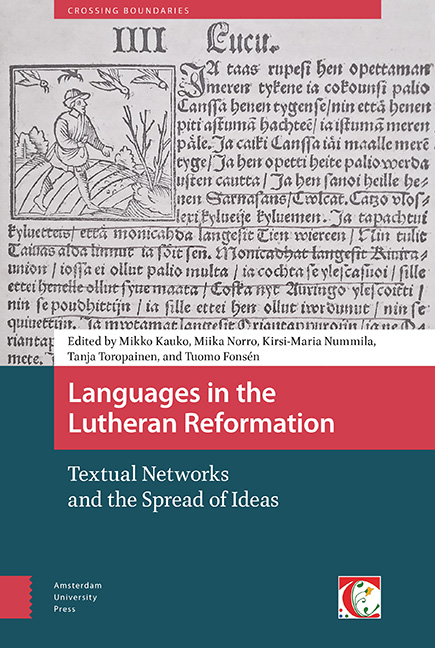Book contents
- Frontmatter
- Contents
- List of Figures and Tables
- Preface
- Introduction
- Part I The Reception of Luther's Ideas and their Influence for the Development of Written Languages
- Part II Effects of Bible Translations on the Evolution of Written Language
- Part III Reuse of (Catholic) Texts after the Reformation
- Part IV Language Contacts and Loanwords
- Index
9 - Traces of Low German Influence in the Finnish Texts of Mikael Agricola?
Published online by Cambridge University Press: 21 November 2020
- Frontmatter
- Contents
- List of Figures and Tables
- Preface
- Introduction
- Part I The Reception of Luther's Ideas and their Influence for the Development of Written Languages
- Part II Effects of Bible Translations on the Evolution of Written Language
- Part III Reuse of (Catholic) Texts after the Reformation
- Part IV Language Contacts and Loanwords
- Index
Summary
Abstract
This essay examines the traces left by Low German on early Finnish translations from the Reformation era. It is well known that Mikael Agricola, Finland's most important reformer and a powerful influence in creating the written Finnish language, used Luther's High German texts as his source texts. This essay complements earlier research by establishing the extent to which the influence of Middle Low German source texts can be seen in the Finnish translations. Interesting potential source texts are, for example, Johannes Bugenhagen's Low German texts from the same period. The essay also considers reasons why the influence of Low German language and Low German texts seems to have remained surprisingly scant in Agricola's work.
Keywords: Finnish, Low German, Mikael Agricola
Agricola in Wittenberg and the linguistic situation in Germany in the 16th century
In the year 1536, two young men from Finland arrived in the German town of Wittenberg in order to study the theology of the new Lutheran confession at the local university (Heininen 2007a: 21). One of them was Mikael Agricola (c. 1510–1557), who was to become the leading figure of the Reformation in Finland and founder of the Finnish literary language (see Toropainen in this volume). Wittenberg was at this time the residential town of the prince-electors of Saxony and the centre from which Martin Luther's reforms had begun to spread less than two decades earlier. Several of the central figures of the Reformation in Germany were affiliated with the University of Wittenberg, which had been founded in 1502.
The Swedish king Gustav Vasa (1496–1560) favoured the reformation in his realm and was therefore vitally interested in the Protestant education of his subjects. This included the large project of translating the Bible into the national language Swedish (see Pettersson in this volume) and the realm’s second language Finnish, which was the majority language of the provinces east of the Gulf of Bothnia. The task of translating the Bible into Finnish was given to the young and ambitious priest Agricola, who was given the chance to travel to Germany in order to study Luther's ideas (Heininen 2007a: 29).
- Type
- Chapter
- Information
- Languages in the Lutheran ReformationTextual Networks and the Spread of Ideas, pp. 217 - 230Publisher: Amsterdam University PressPrint publication year: 2019



